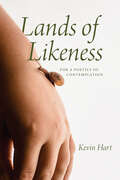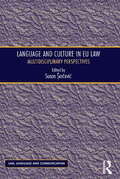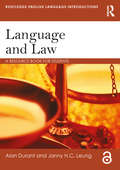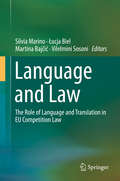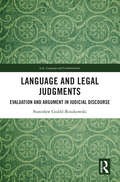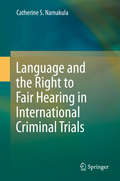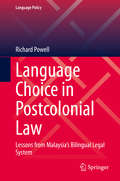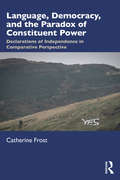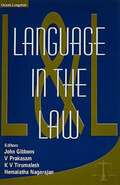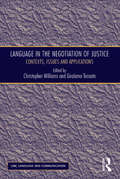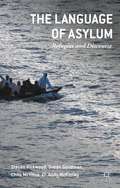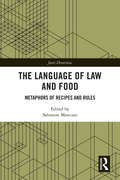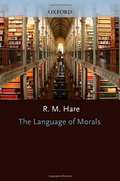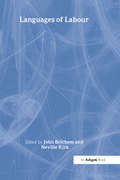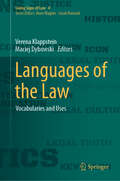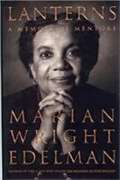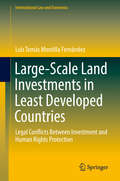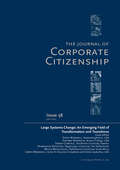- Table View
- List View
Lands of Likeness: For a Poetics of Contemplation
by Kevin HartAn original and profound exploration of contemplation from philosopher, theologian, and poet Kevin Hart. In Lands of Likeness, Kevin Hart develops a new hermeneutics of contemplation through a meditation on Christian thought and secular philosophy. Drawing on Kant, Schopenhauer, Coleridge, and Husserl, Hart first charts the emergence of contemplation in and beyond the Romantic era. Next, Hart shows this hermeneutic at work in poetry by Gerard Manley Hopkins, Marianne Moore, Wallace Stevens, and others. Delivered in its original form as the prestigious Gifford Lectures, Lands of Likeness is a revelatory meditation on contemplation for the modern world.
Landscapes of War: From Sarajevo to Chechnya
by Juan Goytisolo Peter BushAn incisive examination of the tensions that exist between the West and Islamic societies of Europe, North Africa, and the Middle East. Provides rich historical analysis and reportage of life in four explosive war-zones: Sarajevo, Algeria, the West Bank and Gaza, and Chechnya. Translated by Peter Bush.
Language and Culture in EU Law: Multidisciplinary Perspectives (Law, Language and Communication)
by Susan ŠarčevićWritten by distinguished legal and linguistic scholars and practitioners from the EU institutions, the contributions in this volume provide multidisciplinary perspectives on the vital role of language and culture as key forces shaping the dynamics of EU law. The broad spectrum of topics sheds light on major Europeanization processes at work: the gradual creation of a neutralized EU legal language with uniform concepts, for example, in the DCFR and CESL, and the emergence of a European legal culture. The main focus is on EU multilingual lawmaking, with special emphasis on problems of legal translation and term formation in the multilingual and multicultural European context, including comparative law aspects and an analysis of the advantages and disadvantages of translating from a lingua franca. Of equal importance are issues relating to the multilingual interpretation of EU legislation and case law by the national courts and interpretative techniques of the CJEU, as well as the viability of the autonomy of EU legal concepts and the need for the professionalization of court interpreters Union-wide in response to Directive 2010/64/EU. Offering a good mix of theory and practice, this book is intended for scholars, practitioners and students with a special interest in the legal-linguistic aspects of EU law and their impact on old and new Member States and candidate countries as well.
Language and Law: A resource book for students (Routledge English Language Introductions)
by Alan Durant Janny HC LeungLanguage plays an essential role both in creating law and in governing its implementation. Providing an accessible and comprehensive introduction to this subject, Language and Law: describes the different registers and genres that make up spoken and written legal language and how they develop over time; analyses real-life examples drawn from court cases from different parts of the world, illustrating the varieties of English used in the courtroom by speakers occupying different roles; addresses the challenges presented to our notions of law and regulation by online communication; discusses the complex role of translation in bilingual and multilingual jurisdictions, including Hong Kong and Canada; and provides readings from key scholars in the discipline, including Lawrence Solan, Peter Goodrich, Marianne Constable, David Mellinkoff, and Chris Heffer. With a wide range of activities throughout, this accessible textbook is essential reading for anyone studying language and law or forensic linguistics. Sections A, B, and C of this book are freely available as a downloadable Open Access PDF under a Creative Commons Attribution-Non Commercial-No Derivatives 4.0 license available at http://www.taylorfrancis.com/books/e/9781315436258
Language and Law: The Role Of Language And Translation In Eu Competition Law
by Silvia Marino Łucja Biel Martina Bajčić Vilelmini SosoniThe book provides an overview of EU competition law with a focus on the main developments in Italy, Spain, Greece, Poland and Croatia and offers an in-depth analysis of the role of language, translation and multilingualism in its implementation and interpretation.The first part of the book focuses on the main developments in EU competition law in action, which includes legislation, case law and praxis. This part can be divided into two subparts: the private enforcement of EU competition law, and the cooperation among enforcers, i.e. the EU Commission, the national competition authorities and the national courts. Language is of paramount importance in the enforcement of EU competition law, and as such, the second part highlights legal linguistic skills, showcasing the advantages and the challenges of multilingualism, especially in the context of the predominant use of English as the EU drafting and vehicular language.The volume brings together contributions prepared and presented as part of the EU-funded research project “Training Action for Legal Practitioners: Linguistic Skills and Translation in EU Competition Law".
Language and Legal Judgments: Evaluation and Argument in Judicial Discourse (Law, Language and Communication)
by Stanisław Goźdź-RoszkowskiIntegrating research methods from Linguistics with contemporary Legal Argumentation Theory, this book highlights the complexities of legal justification by focusing on the role of value-laden language in argument construction and use. The combination of linguistic analysis and the pragma-dialectic approach to legal argumentation yields a new way of perceiving and understanding the phenomenon of evaluation, one that offers theoretical and practical gains. Analyzing a vast corpus of judicial opinions from the United States Supreme Court and Poland’s Constitutional Court, the book paints a clear picture of complex linguistic choices made by judges to assess and support arguments in the justifications of their decisions. The book will be of interest to scholars in Law, Linguistics and Rhetoric, as well as to judges and practicing lawyers engaged in the art of argumentation.
Language and the Right to Fair Hearing in International Criminal Trials
by Catherine S. NamakulaLanguage and the Right to Fair Hearing in International Criminal Trials explores the influence of the dynamic factor of language on trial fairness in international criminal proceedings. By means of empirical research and jurisprudential analysis, this book explores the implications that conducting a trial in more than one language can have for the right to fair trial. It reveals that the language debate is as old as international criminal justice, but due to misrepresentation of the status of language fair trial rights in international law, the debate has not yielded concrete reforms. Language is the core foundation for justice. It is the means through which the rights of the accused are secured and exercised. Linguistic complexities such as misunderstandings, translation errors and cultural distance among participants in international criminal trials affect courtroom communication, the presentation and the perception of the evidence, hence jeopardizing the foundations of a fair trial. The author concludes that language fair trial rights are priority rights situated in the minimum guarantees of fair criminal trial; the obligation of the court to ensure fair trial or accord the accused person a fair hearing also includes the duty to ensure they can understand and be understood.
Language Choice in Postcolonial Law: Lessons from Malaysia’s Bilingual Legal System (Language Policy #22)
by Richard PowellThis book discusses multilingual postcolonial common law, focusing on Malaysia’s efforts to shift the language of law from English to Malay, and weighing the pros and cons of planned language shift as a solution to language-based disadvantage before the law in jurisdictions where the majority of citizens lack proficiency in the traditional legal medium. Through analysis of legislation and policy documents, interviews with lawyers, law students and law lecturers, and observations of court proceedings and law lectures, the book reflects on what is entailed in changing the language of the law. It reviews the implications of societal bilingualism for postcolonial justice systems, and raises an important question for language planners to consider: if the language of the law is changed, what else about the law changes?
Language, Democracy, and the Paradox of Constituent Power: Declarations of Independence in Comparative Perspective
by Catherine FrostIn this book, Catherine Frost uses evidence and case studies to offer a re-examination of declarations of independence and the language that comprises such documents. Considered as a quintessential form of founding speech in the modern era, declarations of independence are however poorly understood as a form of expression, and no one can completely account for how they work. Beginning with the founding speech in the American Declaration, Frost uses insights drawn from unexpected or unlikely forms of founding in cases like Ireland and Canada to reconsider the role of time and loss in how such speech is framed. She brings the discussion up to date by looking at recent debates in Scotland, where an undeclared declaration of independence overshadows contemporary politics. Drawing on the work of Hannah Arendt and using a contextualist, comparative theory method, Frost demonstrates that the capacity for renewal through speech arises in aspects of language that operate beyond conventional performativity. Language, Democracy, and the Paradox of Constituent Power is an excellent resource for researchers and students of political theory, democratic theory, law, constitutionalism, and political history.
Language, Development Aid and Human Rights in Education: Curriculum Policies In Africa And Asia (Palgrave Studies In Global Citizenship Education And Democracy Ser.)
by Zehlia Babaci-WilhiteThe debate about languages of instruction in Africa and Asia involves an analysis of both the historical thrust of national government and also development aid policies. Using case studies from Tanzania, Nigeria, South Africa, Rwanda, India, Bangladesh and Malaysia, Zehlia Babaci-Wilhite argues that the colonial legacy is perpetuated when global languages are promoted in education. The use of local languages in instruction not only offers an effective means to contextualize the curriculum and improve student comprehension, but also to achieve quality education and rights in education.
Language in the Law
by V. Prakasam John Carey John Gibbons K. V. TirumaleshThe Language in the Law records the different modes and practices in the use of language related to law. The nexus between language and the law in various countries and cultures is examined in this book.
Language in the Negotiation of Justice: Contexts, Issues and Applications (Law, Language and Communication)
by Girolamo TessutoThis book explores the ways language is used by the professional legal community for the communication of its main business - the negotiation of justice - in today’s globalized world. The volume addresses three main aspects of language use in the negotiation of justice. Beginning with the legal contexts of litigation, arbitration and mediation, the book moves on to discuss the main issues identified in those contexts and finally it explores the applications of legal linguistics. These three aspects are studied across the themes of analyses of legal discourse and genres, issues of power and ideology in the use of legal language, cross-cultural legal communication, questions of recontextualization, accessibility and plain language, law and disciplinary identity, and pedagogy of legal language. With chapters set across a variety of jurisdictions, the contributions offer analytical insights into the interface between law and language. The book is a valuable resource for those in the legal community wishing to increase their understanding of the use of language for the negotiation of justice.
The Language of Asylum: Refugees And Discourse
by Simon Goodman Steve Kirkwood Chris McVittie Andy McKinlayThe early part of the 21st century has been marked by widespread social upheaval and geographical displacement of people. This book examines how refugees, asylum-seekers, locals and professional refugee workers make sense of asylum and refuge in the context of current UK asylum policies.
The Language of Law and Economics
by Francesco ParisiFrom a historical perspective, 'law and economics' constituted one of the most influential developments in legal scholarship in the twentieth century; the discipline remains today one of the dominant perspectives on the law, generating a tremendous quantity of new research and discussion. Unfortunately, one consequence of applying the analytical methods of one highly technical field to the historically layered substance of another has been the accumulation of considerable technical overhead, requiring fluency in both the language of economics and the language of the law. Further complicating matters, the field of law and economics has sometimes developed independently, creating new terms, while recasting others from their original economic or legal meanings. In this dictionary of law and economics, Francesco Parisi provides a comprehensive and concise guide to the language and key concepts underlying this fecund interdisciplinary tradition. The first reference work of its kind, it will prove to be an invaluable resource for professionals, students and scholars.
The Language of Law and Food: Metaphors of Recipes and Rules (Juris Diversitas)
by Salvatore MancusoThis book reconsiders the use of food metaphors and the relationship between law and food in an interdisciplinary perspective to examine how food related topics can be used to describe or identify rules, norms, or prescriptions of all kinds. The links between law and food are as old as the concept of law. Many authors have been using such links in creative ways to express specific features of law. This is because the language of food and cooking offers legal thinkers and teachers mouth-watering metaphors, comparing rules to recipes, and their combination to culinary processes. This collection focuses on this relationship between law and food and takes us far beyond their mere interaction, to explore different ways of using these two apparently so diverse elements to describe different phenomena of the legal reality. The authors use the link between food and law to describe different aspects of the legal landscape in different areas and jurisdictions. Bringing together metaphors and indirect correlations between law and food, the book explores different models of approaching legal issues and considering different legal challenges from a completely new perspective, in line with the multidisciplinary approach that leads comparative legal studies today and, to a certain extent, revisiting and enriching it. With contributions in English and French, the book will be of interest to academics and researchers working in the areas of law and food, law and language, and comparative legal studies.
The Language of Law and the Foundations of American Constitutionalism
by Gary L. McdowellFor much of its history, the interpretation of the United States Constitution presupposed judges seeking the meaning of the text and the original intentions behind that text, a process that was deemed by Chief Justice John Marshall to be "the most sacred rule of interpretation. " Since the end of the nineteenth century, a radically new understanding has developed in which the moral intuition of the judges is allowed to supplant the Constitution's original meaning as the foundation of interpretation. The Founders' constitution of fixed and permanent meaning has been replaced by the idea of a "living" or evolving constitution. Gary L. McDowell refutes this new understanding, recovering the theoretical grounds of the original Constitution as understood by those who framed and ratified it. It was, he argues, the intention of the Founders that the judiciary must be bound by the original meaning of the Constitution when interpreting it.
The Language Of Morals
by R. M. HareHare has written a clear, brief, and readable introduction to ethics which looks at all the fundamental problems of the subject.
Languages of Labour
by John Belchem Neville KirkThis volume offers a multidisciplinary approach to the study of language in relation to the subject of history. The British and American contributors put forward the idea that language is a broadly based means of communication with contested and consensual meanings, and that such meanings must be revealed and evaluated by precise historical contextualisation of language and proper attention to established rules of historical method. The essays contend that the connections between the linguistic and the social must be rethought. The book aims to move beyond the unproductive fragmentation and relativism, the narrow textual range and the literal and anti-realist readings of the postmodern ’linguistic turn’ to offer a rigorous approach to the study of language and the subject of history.
Languages of the Law: Vocabularies and Uses (Living Signs of Law #4)
by Verena Klappstein Maciej DybowskiLaw can be seen as a motley of different languages deployed in the legal domain. The authors of the chapters share interest in what determines the scope of the vocabulary of these languages as well as in the way they are used. Thus, both the linguistic and pragmatic turns occurring in the philosophy of language are explored as exercising not mere ripple effects on legal scholarship, but rather as having a huge impact on jurisprudence. The chapters in this volume tackle three broad problem areas to offer a coherent picture of languages of the law. The first section is devoted to legal language at large, including reflections on its nature and some distinct functions it performs in the legal domain. The second section of the book focuses on the distinctly legal and pragmatic dimensions of some fragments of vocabulary, used either in legal texts or in legal scholarship. In the third section of the volume, authors research specific questions regarding legal language and legal reasoning.
Lanson Lectures in Bioethics (2016-2022): Assisted Suicide, Responsibility, and Pandemic Ethics
by Hon-Lam LiBioethical issues are practically urgent, politically divisive, and call for resolutions. They often involve questions that are perplexing, deep, and profound. To deal with them adequately requires philosophical tools and imagination. The Lanson Lectures in Bioethics were founded upon the belief that philosophical elucidation can clarify the nature of these difficult issues, and can lead to their resolution. The present volume collects the first five lectures delivered by five preeminent moral philosophers between 2016 and 2022. In the inaugural lecture, Jonathan Glover draws a distinction between two conceptions of dignity, and brings it to bear on the issues of assisted suicide, embryo research, and genetic choices. F. M. Kamm argues that doctors are morally permitted to intentionally cause death, or assist in its being intentionally caused, when either death is imminent anyway and intentionally causing it can alone stop the pain, or if the patient has already decided—not unreasonably—that death is his least bad option. Are smokers who contract lung cancer entitled to state-supported healthcare? T. M. Scanlon argues that the reasons that individuals have for wanting to have the opportunity to engage in activities involving risks need to be compared with the costs society has to bear to provide healthcare for those who suffer illness or injury as a result of these activities. Rejecting Strawson’s view that a psychiatrist can only “treat” an insane patient, Victor Tadros argues that it is often right to reason with (nonresponsible) mentally ill persons because a psychiatrist needs to see things from their perspectives, and that we should communicate to nonresponsible agents that their wrongdoing is a problem for them and for their victims. Peter Singer proposes solutions to the following questions: How to distribute scarce medical resources and vaccines ethically? Whether to relax the standard for volunteers willing to participate in vaccines research? How to compare the trade-off between saving lives and saving the economy regarding lockdowns? How to prevent pandemics in future?Each lecture is followed by a critical commentary by a moral philosophers or physician in Asia. Each commentary (except the inaugural lecture) is followed by a rejoinder.
Lanterns: A Memoir of Mentors
by Marian Wright EdelmanMemoir by founder of the Children's Defense Fund with portraits of the many mentors who helped shape her.
Laptop from Hell: Hunter Biden, Big Tech, and the Dirty Secrets the President Tried to Hide
by Miranda DevineAs seen on Tucker Carlson Tonight! The inside story of the laptop that exposed the president&’s dirtiest secret.When a drug-addled Hunter Biden abandoned his waterlogged computer at a Mac repair shop in Delaware in the spring of 2019, just six days before his father announced his candidacy for the United States presidency, it became the ticking time bomb in the shadows of Joe Biden&’s campaign. The dirty secrets contained in Hunter&’s laptop almost derailed his father&’s presidential campaign and ignited one of the greatest media coverups in American history. This is the unvarnished story of what&’s really inside the laptop and what China knows about the Bidens, by the New York Post journalist who brought it into the open. It exposes the coordinated censorship operation by Big Tech, the media establishment, and former intelligence operatives to stifle the New York Post&’s coverage, in a chilling exercise of raw political power three weeks before the 2020 election. A treasure trove of corporate documents, emails, text messages, photographs, and voice recordings, spanning a decade, the laptop provided the first evidence that President Joe Biden was involved in his son&’s ventures in China, Ukraine, and beyond, despite his repeated denials. This intimate insight into Hunter&’s dissolute lifestyle shows he was incapable of holding down a job, let alone being paid tens of millions of dollars in high-powered international business deals by foreign interests, unless he had something else of value to sell—which of course he did. He was the son of the vice president who would go on to become the leader of the free world.
LARB Digital Editions: The Law Issue
by Barry A. Sanders Jonathan Shapiro Frank Gruber Jim Lafferty Don FranzenA collection of essays on the topic of the law and legal affairs, selected in order to give readers samples of the ways in which the subject of law relates to the study of ourselves and our times. Those included in this publication are just a sample of the books reviewed over the last year and a half - reviews that cover a variety of topics, some very current, some historical and some dealing with debates spanning centuries.A review of Judge Wilkinson's Cosmic Constitutional Theory surveys the leading theories of the Constitution and how to interpret it. Two equally brilliant and contrasting views on the meaning of our nation's founding document are provided through interviews with Justice Antonin Scalia and Yale Law Professor Akhil Reed Amar. Between these three pieces, the reader will find a sharp debate as to whether a literal reading or a living interpretation of the document should govern our age.Also included is a thoughtful treatment of the macroeconomic disconnect between the numbers of new lawyers churned out by our educational system and the market for these new entrants. To see how far we've come since the first women sought admission to the bar, read a review of Jill Norgren's Rebels at the Bar: The Fascinating, Forgotten Stories of America's First Women Lawyers.The articles featured in this publication, by the breadth of the issues they survey, show rather that the law is a rich bed of moral inquiry, an all too true reflection of our times and ourselves.
Large-Scale Land Investments in Least Developed Countries: Legal Conflicts Between Investment and Human Rights Protection (International Law and Economics)
by Luis Tomás Montilla FernándezThis book analyses large-scale land investments for agricultural purposes in Africa’s least developed countries from a law and economics perspective. Focusing on the effects of foreign land investments on host countries’ local populations and the apparent failure of international law to create incentives to offset them, it also examines the legal and economic mechanisms to hold investors accountable in cases where their investment leads to human rights violations. Applying principal agent and contract theory, it elucidates the sources of opportunism and develops control mechanisms to ameliorate the negative effects. It shows that although judicial mechanisms fail to deliver justice, international law offers alternatives to safeguard against arbitrary and abusive state and investor conduct, and also to effectuate human rights and, thus, tackle opportunistic behaviour.
Large Systems Change: A Special Theme Issue of The Journal of Corporate Citizenship (Issue 58)
Large Systems Change (LSC) is a field of study and action that is characterized by its focus on transformational pathways towards a participative, flourishing future through inter- and trans-disciplinary approaches that value engagement with practitioners and those aspiring for such futures. Its emergence holds great promise for addressing critical issues. Advancing its development requires aggressiveness to cross the many disciplinary, institutional and other boundaries and build the necessary scale of effort; however, humbleness is also required to recognize that although we have substantial knowledge and methodologies for approaching LSC, we are still at early stages of their development. The papers in this Special Issue of The Journal of Corporate Citizenship focus on the question of how to scale to the field of LSC. We can see the contributors and editors reflect on this at the three levels: broadening by increasing the numbers of people and organizations identified with it; going up and out with a more receptive environment arising with failures of traditional management approaches; and deepening of knowledge and methods for supporting LSC. This Special Issue will be essential reading for those researching in this emerging field, and practitioners looking for the latest thinking on how LSC may be a solution to global challenges.
